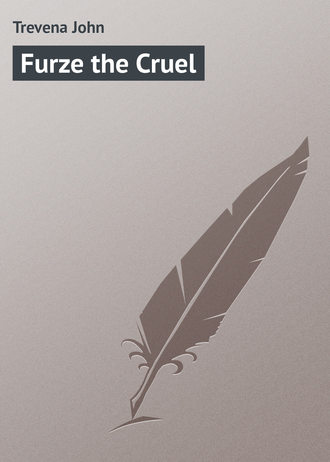 полная версия
полная версияFurze the Cruel
Greater evils followed. An eccentric gentleman rose and recited a story about a lady trying to mount an overcrowded street-car, and being dragged along the entire length of a street, chatting to the conductor the while; quite a harmless story, but it made Brentor to grin. Church-people laughed noisily, and even Methodists tittered. Nonconformist maids of established reputations giggled, and their young men cackled like geese. It was in short a laughing audience. The threepenny-bits shivered. Fire from heaven was already overdue. Complete destruction might be looked for at any moment. One nervous old woman crept out. She had heard the doctrine of eternal punishment expounded in that place, and she explained she could remain there no longer and listen to profanity. The performer again obliged; this time with a comic song which set the seal of blasphemy upon the whole performance. Chegwidden turned his face to the wall, moaned, and demanded of a neighbour what he thought of it all.
"Brave fine singing," came the unscrupulous answer, which seemed to denote that the speaker had also been carried away by enthusiasm.
This was the last straw. Even the lights of Ebenezer were flickering and going out. Chegwidden and Pendoggat appeared to be the only godly men left. The farmer turned upon the irreligious speaker, and crushed him with weighty words.
"'Twas here father prayed," he said, in a voice unsteady with grief and alcohol. "Twice every Sunday, and me with 'en, and he've a-shook me in this chapel, and punched my ear many a time when I was cracking nuts in sermon time. Father led in prayer here, and he've a-told me how he once prayed twenty minutes by the clock. Some said 'twas nineteen, but father knew 'twas twenty, 'cause he had his watch in his hand, and never took his eyes off 'en. Never thought he'd do the last minute, but he did. They was religious volks in them days. Father prayed here, I tells ye, and I learnt Sunday-school here, and 'twas here us all learnt the blessed truths of immorality." – again he blundered in his meaning – "and now it be a place for dancing, and singing, and play-acting, and us will be judged for it, and weighed in the balances and found wanting."
"Us can repent," suggested the neighbour.
Chegwidden would not admit this. "Them what have laughed here to-night won't die natural, not in their beds," he declared. "They'll die sudden. They'll be cut off. They've committed blasphemy, which is the sin what ain't forgiven."
Then Chegwidden turned upon the doorkeeper and demanded his money back. He was not going to remain among the wicked. He was going to spend the rest of the evening respectably at the inn.
After that the programme continued for a little without interruption. Then a young lady, who had been especially imported for the occasion, obliged with a violin solo. She played well, but made the common mistake of amateurs before a rural audience; preferring to exhibit her command over the instrument by rendering classical music, instead of playing something which the young men could whistle to. It was a very soft piece. The performer bent to obtain the least possible amount of sound from a string; and at that critical moment a loud weary voice startled the religious silence of the room —
"Aw, my dear life! Bain't it a shocking waste o' time?"
It was Mary, who was feeling bored. The novelty of the performance had worn off. She was prepared to sit there and hear a good noise. She liked the piano when it was giving forth plenty of crashing chords; but that whining scraping sound was intolerable. It was worse than any old cat.
There was some commotion in the front seats, and shocked faces were turned upon Mary, while the performer almost broke down. She made another effort, but it was no use, for Mary continued at the top of her voice —
"Ole Will Chanter had a fiddle like thikky one. Du'ye mind, Peter?"
Indignant voices called for silence, but Mary only looked about in some amazement. She couldn't think what the people were driving at. As she was not being entertained there was nothing to prevent her from talking, and it was only natural that she should speak to Peter; and if the folks in front did not approve of her remarks they need not listen. The violinist had dropped her arms in despair; but when she perceived silence was restored she tried again.
"Used to play 'en in Peter Tavy church," continued Mary, with much relish. "Used to sot up in the loft and fiddle cruel. Didn't 'en, Master? Don't ye mind ole Will Chanter what had a fiddle like thikky one? His brother Abe sot up wi' 'en, and blowed into a long pipe. Made a cruel fine noise, them two."
Mary was becoming anecdotal, and threatening to address the audience at some length, so the violinist had to give up and make way for a vocalist with sufficient voice to drown these reminiscences of a former generation.
After the concert there were disturbances outside. One faction cheered the performers; another hooted them. Then a light of Ebenezer kindled into religious fire and hit an Anglican postman in the eye. The response of the Church Militant loosened two Nonconformist teeth. Chegwidden reappeared on horseback, swaying from side to side, holding on by the reins, and raising the cry of down with everything except Ebenezer and liquor-shops.
Pendoggat stood aloof, looking on, hoping there would be a fight. He did not mix in such things himself. It was his custom to stand in the background and work the machinery from outside. He liked to see men attacking one another, to watch pain inflicted, and to see the blood flow. Turning to the man whose mouth had been damaged he muttered: "Go at him again."
"I'm satisfied," came the answer.
"He called you a dirty monkey," lied Pendoggat.
The insult was sufficient. The Anglican postman was walking away, having fought a good fight for the faith that was in him, by virtue of two shillings a week for various duties, and his Opponent seizing the opportunity attacked him vigorously from the rear. Peter and Mary watched the conflict, and their savage souls rejoiced. This was better than all the pianos and fiddles in the world. They felt at last they were getting value for their free tickets.
Sport was terminated by the sudden appearance of the Maggot. He had been drafting a prospectus of the "Tavy Nickel Mining Company, Limited," and had issued forth to look for the managing director. He stopped the fight and lectured the combatants in spiritual language. He comprehended how the ex-chapel had been desecrated that night by godless people, and he appreciated the zeal which had prompted a member of his congregation to defend its sanctity; but he explained that it was not lawful for Christians to brawl upon the streets. To take out a summons for assault was far holier. The man with the loosened teeth explained that he should do so. It was true he had incited the postman to fight by striking him first; but then he had struck him with Christian charity in the eye, which entailed only a slight temporary discomfort and no permanent loss; whereas the postman had struck him with brutal ferocity on the mouth, depriving him of the services of two teeth; and had moreover added obscene language, as could be proved by impartial witnesses. Pezzack assured him that the teeth Bad fallen in a good cause; men and women had been tortured and burnt at the stake for their religion; and he quoted the acts of Bloody Mary, that bigoted lady who has become the hardy perennial of Nonconformist sermons, with a strong emphasis upon the qualifying, adjective. The champion went away delighted. He had won his martyr's crown, and his teeth were not so very loose after all. A little beer would soon tighten them.
The crowd was dwindling away with its grievances. The folks would chatter furiously for a few days; then the affair would drop and be forgotten, and a fresh scandal would fill the vacancy. They would never bite so long as they had liberty to bark. Chegwidden had galloped off across the moor in his usual wild way. Every week he would visit some inn, upon what might have been called his home circuit, and at closing time would commit his senseless body to his horse with the certain hope of being carried home. To gallop wildly over Dartmoor at night might be ranked as an almost heroic action. The horse had brains fortunately. Chegwidden was only the clinging monkey upon its back. The farmer had fallen on several occasions, but had escaped with bruises. One night he would break his neck, or crack his head upon a boulder, and die as he had lived – drunk. Drunkenness is not a vice upon Dartmoor; nor a fault even. It is a custom.
The Maggot found Pendoggat. They greeted one another in a fraternal way, then began to walk down from the village. The night was clear ahead of them, but above Brentor, with its church, which looked rather like an exaggerated locomotive in that light, the sky, or "widdicote," as Mary might have called it, was red and lowering.
"Well, what about business?" said Pendoggat.
"I am not finding it easy, Mr. Pendoggat," said the minister. "Folks are nervous, and, as you know, there is not much money about. But they trust me, Mr. Pendoggat. They trust me," he repeated fervently.
"Got any promises?"
"A few half-promises. I could do better if I was able to show them the mine. If you would come forward, with your wisdom and experience, I think we should do well. I mentioned that you were interested."
"I told you to keep my name out of it," said Pendoggat.
"But that is impossible. I cannot tell a lie, Mr. Pendoggat," said Eli, with the utmost deference.
"You're suspicious," said the other sharply. "You don't trust me. Say it out, Pezzack."
"I do trust you, Mr. Pendoggat. I have given you this 'and," said Eli, extending a clay-like slab. "I have seen with my own eyes the sides of that cave gleaming with precious metal like the walls of the New Jerusalem. I can take your 'and now, and look you in the heye, and say 'ow I trust you. We 'ave prayed side by side, and you 'ave always prayed fair. Now that we are working side by side I know you'll work fair. But I 'ave thought, Mr. Pendoggat, 'ow you seem to be putting too much upon me."
"I'll tell you how it is. I'm pushed," Pendoggat muttered. "Nobody knows it, but I'm deep in debt. Do you think I'd be such a fool as to give this find of mine away for nothing, as you might say, unless I'd got to?" he went on sullenly. "I've known of it for years. I've spent days planting willows and fern about the entrance to that old shaft, to close it up and make folk forget it's there. I meant to bide my time till I could get mining folk in London to take it up and make a big thing out of it. I'm a disappointed man, Pezzack. I'm in debt, and I've got to suffer for it."
He paused, scowling sullenly at his companion.
"My 'eart bleeds for you, Mr. Pendoggat," said simple Eli. He thought that was a good and sympathetic phrase, although he somewhat exaggerated the actual state of his feelings.
"I've kept 'em quiet so far," said Pendoggat. "I've paid what I can, and they know they can't get more. But if 'twas known about this mine, and known I was running it, they'd be down on me like flies on a carcase, and would ruin the thing at once. The only chance for me was to look out for a straight man who could float the scheme in his name while I did the work. I knew only one man I could really trust, and that man is you."
"It is very generous of you, Mr. Pendoggat," said the buttered Eli.
They had reached the railway bridge, and there stopped, being upon the edge of the moor. Beneath them was Brentor station gone to sleep; beyond, in its cutting, that of Mary Tavy. The lines of two rival companies ran needlessly side by side, silently proclaiming to the still Dartmoor night the fact that railway companies are quite human and hate each other like individuals. Pendoggat was looking down as usual, therefore his eyes were fixed upon the rival lines. Possibly he found something there to interest him.
"I'll get you some samples. You can take them about with you," he went on. "We'll have a meeting too."
"At the Barton?" suggested Eli.
"The chapel," said Pendoggat.
"Commencing with a prayer-meeting," said Eli. "That is a noble thought, Mr. Pendoggat. We will seek a blessing on the work."
"The chapel must be rebuilt," said Pendoggat.
"The Lord's work first. Yes, that is right. That is like you, Mr. Pendoggat. I will communicate with some friends in London. I 'ave an uncle who is a retired grocer. He lives at Bromley, Mr. Pendoggat. He will invest part of his savings, I am convinced. He has confidence in me. He had me educated for the ministry. He will persuade others to invest, perhaps."
Pendoggat moved forward, and set his face towards the moor. "I must get on," he said. "I'll see you on Sunday. Have something to tell me by then."
"Let us seek a blessing before we part," said Pezzack.
Pendoggat turned back. He was always ready to obtain absolution. They stood upon the bridge, removed their hats, while Eli prayed with vigour and sincerity. He did not stop until the rumble of the night mail sounded along the lines and the metals began to hum excitedly. The "widdicote" above St. Michael's was still red and lowering. The church might have been a furnace, emitting a strong glow from fires within its tower.
CHAPTER VII
ABOUT FAIRYLAND
By the time Boodles was sixteen she was shaped and polished. Weevil had done what he could; not much, for the poor old thing was neither learned nor rich; and she had gone to Tavistock, where various arts had been crammed into her brain, all mixed up together like the ingredients of a patent pill. Boodles knew a good deal for seventeen; but Nature and Dartmoor had taught her more than the school-mistress. She was a fresh and fragrant child, with no unhealthy fancies; loving everything that was clean and pretty; loathing spiders, and creeping things, and filth in general; and longing ardently already to win for herself a name and a soul a little higher than the beetles. They were presumptuous longings for a child of passion, who did not know her parents, or anything about her origin beyond the fact that she had been thrown out in a bundle of fern, and taken in and cared for by Abel Cain Weevil.
At the tender age of fourteen Boodles received her love-wound. It was down by the Tavy, where the water swirls round pebbles and rattles them against its rocks below Sandypark. Her love-affair was idyllic, and therefore dangerous, because the idyllic state bears the same resemblance to rough and brutal life as the fairy-tale bears to the true story of that life. The tales begin with "once upon a time," and end with "they lived happily ever after." The idyllic state begins in the same way, but ends, either with "they parted with tears and kisses and never saw each other again," or "they married and were miserable ever afterwards." Only children can blow idyll-bubbles which will float for a time. Elderly people try, but they only make themselves ridiculous, and the bubbles will not form. People of thirty or over cannot play at fairy-tales. When they try they become as fantastic a sight as an old gentleman wearing a paper hat and blowing a penny trumpet. Shakespeare, who knew everything about human nature that men can know, made his Romeo and Juliet children, and ended their idyll as such things must end. Customs have changed since; even children are beginning to understand that life cannot be made a fairy-tale; and Romeo prefers the football field to sighing beneath a school-girl's balcony; and Juliet twists up her hair precociously and runs amok with a hockey-stick.
Still fairy-tales lift their mystic blooms to the moon beside the Tavy, and Boodles had seen those flowers, and wandered among them very delicately. The boy was Aubrey Bellamie, destined for the Navy, and his home was in Tavistock. He had come into the world, amid an odour of respectability, two years before Boodles had crept shamefully up the terrestrial back stairs. All he knew about Boodles was the fact that she was a girl; that one all-sufficient fact that makes youths mad. He knew, also, that her head was glorious, and that her lips were better than wine. He was a clean, pretty boy; like most of the youths in the Navy, who are the good fresh salt of Devon and England everywhere. Boodles came into Tavistock twice a week to be educated, and he would wait at the door of the school until she came out, because he wanted to educate her too; and then they would wander beside the Tavy, and kiss new knowledge into each other's young souls. The fairy-tale was real enough, because real life had not begun. They were still in "once upon a time" stage, and they believed in the happy ending. It was the age of delusion; glorious folklore days. There was enough fire in them both to make the story sufficiently life-like to be mistaken for the real thing. Aubrey's parents did not know of the love-affair then; neither did Weevil. In fairy-tales relations are usually wicked creatures who have to be avoided. So for months they wandered beside the river of fairyland, and plucked the flowers of that pleasant country which were gleaming with idyllic dew.
"I can't think why you love my head so," Boodles had protested, when a thunderstorm of affection had partially subsided. "It's like a big tangle of red seaweed. The girls at the school call me Carrots."
"I should like to hear them," said Aubrey fiercely; "Darling, it's the loveliest head in the world."
And then he went on to talk a lot of shocking nonsense about flowers and sunsets, and all other wondrous flaming things, which had derived their colour and splendour from the light of his sweetheart's head, and from none other source or inspiration whatsoever.
"If I was a boy I shouldn't love a girl with red hair. There are such a lot of girls you might love. Girls with silky flaxen hair, and girls with lovely brown hair – "
"They are only girls," said Aubrey disdainfully. "Not angels."
"Do angels have red hair?" asked Boodles.
"Only a very few," said the boy. "Boodles – and one or two others whose names I can't remember just now. It's not red hair, sweetheart. It's golden, and your beautiful skin is golden too, and there is a lot of gold-dust scattered all over your nose."
"Freckles," laughed Boodles. "Aubrey, you silly! Calling my ugly freckles gold-dust! Why, I hate them. When I look in the glass I say to myself: 'Boodles, you're a nasty little spotted toad.'"
"They are just lovely," declared the boy. "They are little bits of sunshine that have dropped on you and stuck there."
"I'm not sticky."
"You are. Sticky with sweetness."
"What a dear stupid thing!" sighed Boodles. "Let me kiss your lovely pink and white girl's face – there – and there – and there."
"Boodles, dear, I haven't got a girl's face," protested Aubrey.
"Oh, but you have, my boy. It's just like a girl's – only prettier. If I was you, and you was me – that sounds rather shocking grammar, but it don't matter – every one would say: 'Look at that ugly boy with that boodle-oodle, lovely, butiful girl.' There! I've squeezed every bit of breath out of him," cried Boodles.
There was a certain amount left, as she soon discovered; enough to smother her.
"If you hadn't got golden hair, and freckles, I should never have fallen in love with you," declared the boy. "If you were to lose your freckles, if you lost only one, the tiniest of them all, I shouldn't love you any more."
"And if you lose that dear girl's face I won't love you," promised Boodles. "If you had a horrid moustache to tickle me and make me sneeze, I wouldn't give you the smallest, teeniest, wee bit of a kiss. Well, you can't anyhow, because you've got to be an admiral. How nice it will be when you are grown up and have a lot of ships of your own."
"We shall be married long before then. Boodles, darling," cried the eager boy. "Directly I am twenty-one we will be married. Only five more years."
"Such a lot happens in a year," sighed Boodles. "You may meet five more girls far more sunshiny than me, with redder hair and more freckles, since you are so fond of them – "
"I shan't. You are the only girl who ever was or shall be."
That is how boys talk when they are sixteen, and when they are twenty-six, and sometimes when they are very old boys of sixty; and girls generally believe them.
"I wonder if it is right of you to love me," said Boodles doubtfully.
The answer was what might have been looked for, and ended with the usual question: "Why not?"
"Because I'm only a baby."
"You are fourteen, darling. You will be nineteen by the time we are married."
Although they were only at the beginning of the story they were already slapping over the pages, anxious to reach the "lived happily ever after" conclusion. Young people are always wanting to hurry on; middle-aged to marktime; old to look back. The freshness of life is contained in the first chapter. Youth is a time of unnatural strength, of insanity, a dancing-round-the-may-pole sort of time. Common-sense begins to come when one has grandchildren. Boodles and Aubrey wandered a thousand times in love's fairyland on the romantic banks of the rattling Tavy, and knew as much during their last walk as upon the first; knew they were in love cleanly and honestly; knew that the joy of life was no myth; but knowing nothing, either of them, concerning Giant Despair, who has his mantle trimmed with lovers' hearts, or the history of the fair maid of Astolat, or the existence of Castle Dolorous. Love is largely a pleasure of the imagination, thus a fairy-tale, and sound practical knowledge sweeps the romance of it all away.
The whole of that folly – if the only real ecstatic bliss of life which is called first love be folly – seemed gone for ever. Aubrey was packed off to do his part in upholding the honour of Boodlesland, as his country named itself in his thoughts; and the years that intervened discovered him probably kissing girls of all complexions, girls with every shade of hair conceivable, girls with freckles and without; and being kissed by them. Boys must have their natural food, and if the best quality be not obtainable they must take what offers. In the interval Boodles remained entirely unkissed, and received no letters. She wasn't surprised. His love had been too fierce. It had blazed up, burnt her, and gone out. Aubrey had forgotten her; forgotten those wonderful walks in Tavyland; forgotten her radiant head and golden freckles. It was all over, that romance of two babies. It was Boodles who did not forget; Boodles who had the wet pillow sometimes; Boodles who was constant like the gorse, which is in flower all the year round.
No one would call the ordinary Dartmoor postman an angel – his appearance is too much against him – but he does an angel's work. Perhaps there is nothing which quickens the heart of any lonely dweller on the moor so perceptibly as the heavy tread of that red-faced and beer-tainted companion of the goddess of dawn. He leaves curses as well as blessings. He pushes love-letters and bills into the box together. Sometimes he is an hour late, and the miserable watcher frets about the house. Sometimes the wind holds him back. He can be seen struggling against it, and the watcher longs to yoke him to wild horses. There are six precious post-times each week, and the lonely inhabitant of the wilds would not yield one of them to save his soul alive.
There was an angel's visit to Lewside Cottage, and a letter for Boodles fell from heaven. The child pounced upon it, rushed up to her room like a dog with a piece of meat, locked the door lest any one should enter with the idea of stealing her prize, gloated upon it, almost rolled upon it. She did not open it for some time. She turned it over, smelt it, pinched it, loved it. Tavistock was blurred across the stamp. There was no doubt about that letter. It was a tangible thing. It did not fade away like morning dew. She opened it at last, but did not dare to read it through. She took bites at it, tasting it here and there; and had every sentence by heart before she settled down to read it properly. So she was still dearest Boodles, and he was the same devoted Aubrey. The child jumped upon her bed, and bit the pillow in sheer animal joy.
He had just come home, and was writing to her at once. She wouldn't recognise him because he had become a tough brown sailor, and the girl's face was his no longer. He was coming to see her at once; and they would walk again by the Tavy and be just the same as ever; and swear the same vows; and kiss the same kisses; and be each other's sun and moon, and all the rest of the idyllic patter, which was as sweet and fresh as ever to poor Boodles. For he had been all the world over and discovered there was only one girl in it; and that was the girl with the radiant head, and the golden skin, and the gold-dust upon her nose. He was as true as he always had been, and as he always would be for ever and evermore.





